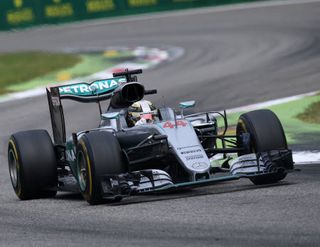Malone Gets Formula One Checkered Flag

John Malone’s systematic transformation of Liberty Media continued last week, after the former programming juggernaut agreed to purchase international racing icon Formula One in a $4.4 billion deal.
After the deal is sealed — expected in early 2017 — Liberty Media Group will change its corporate name to Formula One Group and retire its NASDAQ stock exchange ticker symbol “LMCA,” replacing it with “FWON.”
The Liberty Media Corp. name will live on, at least in the ether — Liberty Media Group is officially a tracking stock of Liberty Media Corp., along with Liberty Braves and Liberty Sirius, which will remain separate.
Malone, Liberty Media chairman, has spent the better part of the past decade breaking apart and spinning off the Liberty assets in a flurry of deals. Liberty Media, which used to house interests in major programmers like Discovery Communications and QVC, has long since spun those holdings out to shareholders.
DEALMAKER’S LATEST DEAL
The deal is the latest over the past three years by the mogul known for dealmaking, beginning with his purchase of a 27% interest in Charter Communications in 2013. In the wake of that deal, Malone helped engineer Charter’s $78.7 billion purchase of Time Warner Cable and its $10.4 billion buy of Bright House Networks.
Other Malone holdings have gone on international buying sprees, like Discovery Communications, which earlier this year bought sports network Eurosport in 2015 and European Olympics rights for the 2018-2024 games.
Multichannel Newsletter
The smarter way to stay on top of the multichannel video marketplace. Sign up below.
In addition, Malone was a key part of Lionsgate’s $4.4 billion purchase of premium channel Starz in June.
Liberty has been in pursuit of Formula One since 2014, when speculation was high Liberty would team with Discovery to buy a 49% interest in the racing icon for about $4 billion. That deal never materialized, but with the most recent transaction, Liberty will get control of one of the hottest properties in international sports.
Formula One splits its revenue between race promotions — it holds the FIA F1 World Championship, among other races — broadcasting, advertising and sponsorship, and other businesses including TV production, hospitality and licensing, according to Liberty. With revenue of about $1.8 billion in the past 12 months, Formula One said it has $9.3 billion in revenue under long-term contracts through 2026.
Liberty shareholders will own 35% of Formula One’s equity (including about 3.1% for Malone personally), with partner CVC Capital Partners controlling 65%. In addition, former 21st Century Fox executive Chase Carey, long a confidante of Fox chairman Rupert Murdoch, will become Formula One’s new chairman after the deal closes, replacing Nestle chairman Peter Brabeck-Letmathe. Controversial British financier Bernie Ecclestone, who built Formula One into a global operation after nearly 40 years, will remain as CEO.
In typical Liberty fashion, the deal is a complicated one. Liberty closed the first part of the deal on Sept. 7, purchasing an 18.7% stake in Formula One for about $746 million. In the second stage, expected to be completed in the first quarter of 2017, Liberty will purchase the remaining voting interest in the company for about $300 million in cash, $350 million in notes and by issuing about 138 million shares of stock worth about $2.9 billion.
On a conference call with analysts to discuss the transaction, Carey said he would build Formula One’s fan base by telling its story. Formula One already is one of the most popular sports properties in the world, with more than 400 million global viewers, but has had difficulty cracking the U.S. market, which is dominated by NASCAR stock car racing. But U.S. viewership is growing, up by about 40% since NBC Sports won domestic broadcast rights in 2013.
DIGITAL GROWTH OPPORTUNITY
Liberty Media CEO Greg Maffei said on the call that the company believes there is opportunity to grow Formula One’s “underdeveloped” digital assets, adding that the company could grow its fan base and revenue through new technologies like virtual reality and via video games.
“There’s interest in this sport around the world,” Carey said on the call. “We want to continue to intelligently explore the opportunities and continue to grow it.”
Pivotal Research Group CEO and senior media & communications analyst Jeff Wlodarczak, called Formula One a “prototypical Malone investment” in that it has a high barrier to entry, a lasting business, evidenced by the $9.3 billion in long-term contracted revenue, and appears to have strong expansion opportunities.
“As we have seen with the NFL, you can expand your broadcast rights fees and create alternative distribution channels (national nets, to DirecTV [NFL] Sunday Ticket, to Thursday Night Football to the RedZone channel),” Wlodarczak wrote in an e-mail message. “They could also look into expansion of races from 21 to the current contractual limit of 25 (the U.S. could be a massive driver of growth long term), repricing of TV contracts materially higher, leveraging ‘sister’ Liberty companies [Liberty Global] and [Discovery’s] Eurosport, expanding digital opportunities.”
